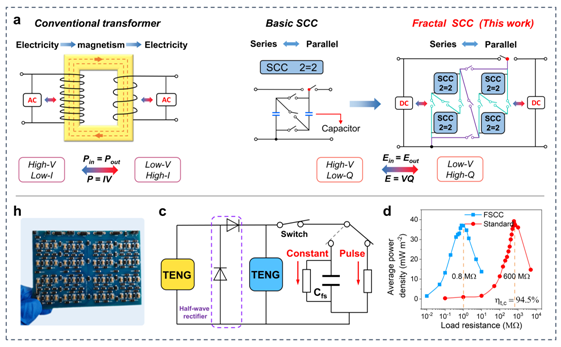The cooperative research paper titled “Switched-capacitor-convertors d on fractal design for output power management of triboelectric nanogenerator” written by scientific research group led by Professor Hu Chenguo from the School of Physics, Chongqing University in collaboration with the research group led by Academician Wang Zhonglin from Beijing Institute of Nanoenergy and Nanosystem, Chinese Academy of Sciences was recently published in Nature Communications, a sub-journal of Nature. Chongqing University is the first organization and corresponding organization. Doctoral candidates Liu Wenlin, Wang Zhao and Wang Gao of Chongqing University are first co-authors. Professor Hu Chenguo and Professor Guo Hengyu from Chongqing University and Academician Wang Zhonglin from Beijing Institute of Nanoenergy and Nanosystem, Chinese Academy of Sciences are corresponding co-authors.
Triboelectric nanogenerator (TENG), as a new technology that is able to efficiently collect mechanical energy in low-frequency environment, has been proved to have great potential in the self-powered sensing system related to biological science, chemistry, intelligent equipment, and mechanical energy collection related to human motion, ocean energy, and wind energy. It is an important way to realize the energy supply of distributed sensors in the Internet of Things. Based on friction electrification and electrostatic induction, TENG can be used to easily generate thousands of volts of high voltage. However, its low charge and current output lead to very low energy efficiency. Therefore, it is urgently needed to achieve high energy efficiency and efficient power management system of TENG. In previous studies, methods such as transformers, mechanical and electronic switches have been used to improve the energy utilization of TENG, resulting in an energy utilization efficiency of 85%. However, these methods often have their limitations while effectively improving the energy utilization efficiency, which would limit their practical application. With the rapid development of energy collection technology, the traditional electromagnetic transformer is unable to meet the needs of conversion various energies. At the same time, with the development trend of integration and high frequency, the switched capacitor converter (SCC) with light weight, non-magnetic application and high conversion efficiency has made it a promising technology in wireless sensor network, DC micro-grid and other aspects.
Based on switched capacitor technology, TENG and fractal theory, the paper proposed a fractal based switched capacitor transducer (FSCC), which has the characteristics like high conversion efficiency, minimized output impedance and strong applicability of electrostatic voltage. As a dual-function output power management system of friction nano generator, it can provide more than 67 times of charge enhancement and 954w m-2 power density in pulse mode, and can achieve more than 94% of total energy transmission efficiency in constant current mode. The establishment of dual-function output power management system is of great significance to the development of TENG power management towards multi-function output. The successful application in the triboelectric nano generator also shows that the switch capacitor converter based on fractal design has great potential in the field of electric vehicle, DC micro-grid and so on.
Link of the paper: https://www.nature.com/articles/s41467-020-15368-9
The research has been supported by the National Natural Science Foundation of China and operating expense on basic scientific research in colleges and universities allocated by the central government.

Figure 1: Fractal switched capacitor transducer and its TENG power management system. a. The comparison of traditional transformer, basic 2-unit SCC unit and 8-unit FSCC unit; b. Physical figure of 96-unit FSCC; c. TENG power management circuit diagram based on FSCC; d. Average output power of FSCC power management circuit and standard circuit in constant current mode.
